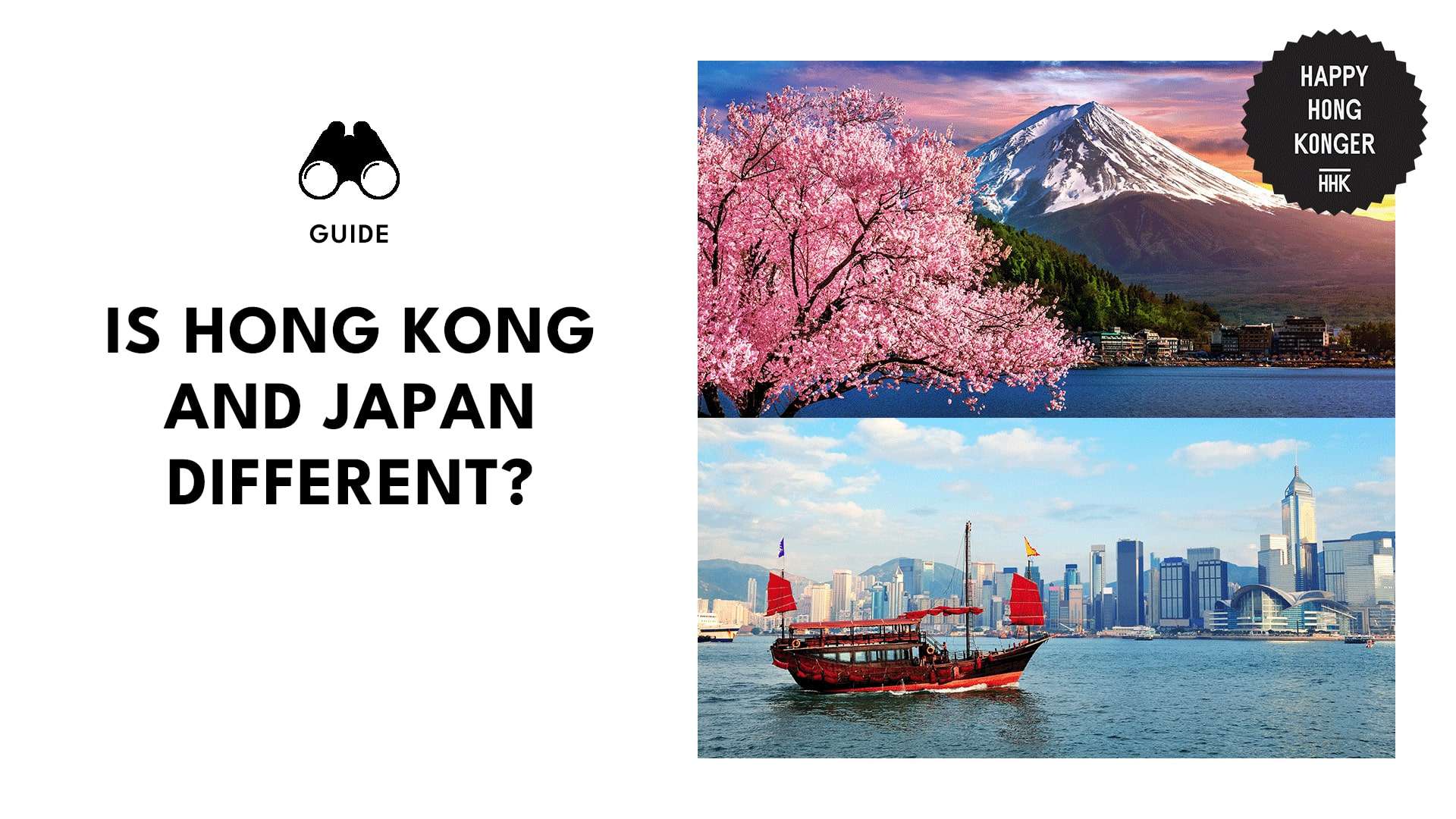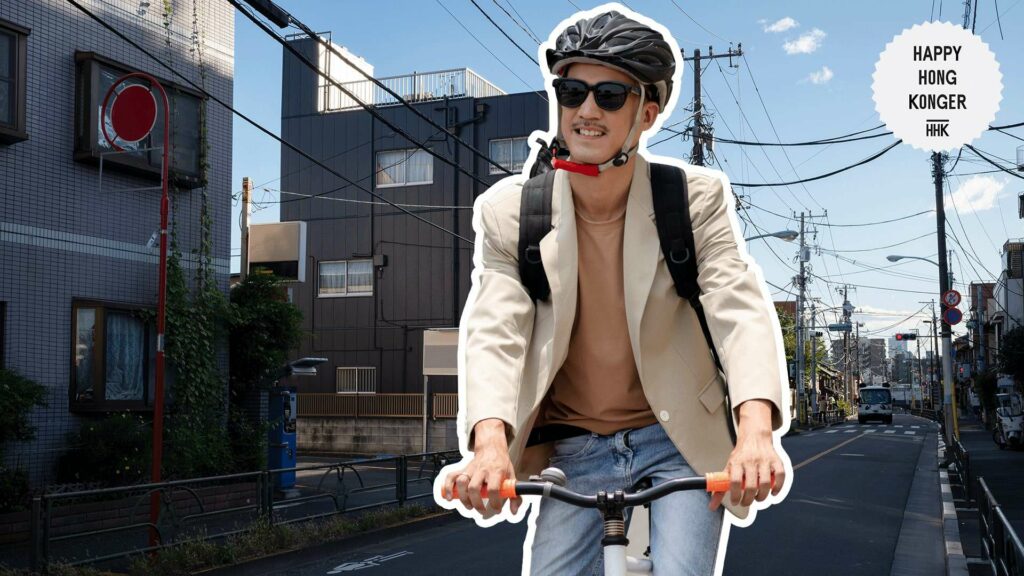Categories > Guides and Tips

Are Hong Kong and Japan different?
- Cost of Living in Hong Kong vs Japan
- Real Estate Prices in Hong Kong vs Japan
- Diversity and Demographics in Hong Kong vs Japan
- Career Opportunities in Hong Kong vs Japan
- Crime Index in Hong Kong vs. Japan
- Lifestyle in Hong Kong vs Japan
- Weather in Hong Kong vs Japan
- Things to Do in Hong Kong vs Japan
- Healthcare in Hong Kong vs Japan
- Hong Kong vs Japan: How They Stack Up
Hong Kong. Japan. Hong Kong. Japan. I’ve been to both (I mean, I live here in Hong Kong!), and to me, they’ve always felt very similar.
I’ve long wondered what caused me to feel that way, so I took some time over the past week to research it. Are Hong Kong and Japan different or similar?
In a literal sense, Hong Kong and Japan are obviously different, with separate geographical locations, histories, and governments. The two share similarities, however, including certain East Asian influences in their cultures.
And obviously, other things will vary, from their economies to their demographics. In any case, let’s go into detail on all of the practical areas where they’re similar or different below!
Cost of Living in Hong Kong vs Japan

The cost of living in Hong Kong is 100% higher than in Japan, specifically vs. the latter’s capital, Tokyo.
This is apparent in their respective average monthly living costs, with Hong Kong at US$ 2,733 and Japan at US$ 1,363. Hong Kong’s high cost of living is primarily due to expenses related to rent and utilities.
To provide you with a perspective on the difference in living expenses between Hong Kong and Japan, we’ve compiled a comparison table below using data sourced from LivingCost.org.
| Expenses | Hong Kong Cost Range | Japan Cost Range |
| Housing (Average Rent per Month) | ||
| 1-bedroom apartment (downtown) | US$ 2,172 | US$ 752 |
| 1-bedroom apartment (outside the city center) | US$ 1,538 | US$ 449 |
| 3-bedroom apartment (downtown) | US$ 4,490 | US$ 1,854 |
| 3-bedroom apartment (outside the city center) | US$ 3,058 | US$ 901 |
| Utilities (Average Monthly Bill) | ||
| Utility bill for one person | US$ 149 | US$ 90.7 |
| Utility bill for a family | US$ 230 | US$ 139 |
| Internet plan | US$ 25.2 | US$ 30.7 |
| Transportation (Fare) | ||
| 1-way ticket (local transport ticket) | US$ 1.53 | US$ 1.01 |
| Monthly pass (local transport ticket) | US$ 63.5 | US$ 46.9 |
| Taxi start (normal tariff) | US$ 13.1 | US$ 27.2 |
| Gasoline (1 liter) | US$ 2.87 | US$ 1.1 |
| Childcare (Tuition Fee) | ||
| Daycare or Preschool | US$ 820 per month | US$ 273 per month |
| International Primary School | US$ 20,404 per year | US$ 13,122 per year |
As you can see, living in Hong Kong compared to Japan, particularly Tokyo, practically means shelling out considerably more for essential expenses.
For instance, securing a 1-bedroom apartment in downtown Hong Kong can set you back around US$ 2,172 monthly. In Japan, a comparable space might cost roughly US$ 752.
These disparities extend to utility bills, transportation costs, and childcare expenses.
This means that day-to-day living in Hong Kong would demand a larger portion of your budget for these necessities compared to residing in Japan.
Real Estate Prices in Hong Kong vs Japan

Hong Kong’s real estate market is much more expensive than Japan’s.
According to LivingCost.org, buying an apartment in Hong Kong’s city center costs about US$ 30,574. But in Japan, a similar apartment in the city center is around US$ 5,598. This shows that properties in Hong Kong are a lot pricier than in Japan.
The difference is similar for suburban houses. In Hong Kong, buying a suburban house is around US$ 20,548, while in Japan, it’s about US$ 2,688.
For someone considering purchasing a property, these numbers suggest that acquiring a home in Hong Kong requires a substantially larger financial commitment compared to Japan.
This situation might make it much more challenging for individuals in Hong Kong to afford a place to live or invest in property compared to those residing in Japan.
Ultimately, this vast difference in real estate costs could greatly affect people’s ability to own a home or make property investments in these locations.
Diversity and Demographics in Hong Kong vs Japan

Hong Kong’s population is more ethnically diverse compared to Japan, where the population is predominantly Japanese and more homogeneous.
However, it’s clear that Japan, being a country, has a significantly larger population and a much larger land area compared to Hong Kong.
The table below offers a detailed comparison of the diversity and demographics between Hong Kong and Japan, sourced from data provided by the Hong Kong Census and Statistics Department and the Statistics Bureau of Japan.
| Hong Kong | Japan | |
| Geographic Location | Special Administrative Region of China | Island nation in East Asia |
| Size (Area) | 1,108 square kilometers | 377,975 square kilometers |
| Population | 7.5 million | 125.8 million |
| Median Age | 45.2 years | 47.6 years |
| Life Expectancy at Birth | 82 years | 85.3 years |
| Ethnicity | 92% Han Chinese (predominantly Cantonese) 4% Other Chinese (including Hakka, Teochew, Shanghainese) 4% Non-Chinese (including Filipinos, Indians, Indonesians, Nepalese) | 98.5% Japanese 1.5% Others (including Korean, Chinese, Ainu) |
Although Hong Kong is much smaller in land area and population – and considered overpopulated due to its limited space – compared to Japan’s vastness and population of 125.8 million, the crucial difference lies in their people.
Hong Kong’s diverse mix of residents reflects a rich culture within a relatively confined space. Conversely, Japan, despite its large population, presents a more homogenous society, with the Japanese population overwhelmingly dominating the country.
Though they differ in size, population, geographic location, and ethnic diversity, Hong Kong and Japan show similar trends in life expectancy and median age.
Both Hong Kong and Japan have high life expectancies, with Japan slightly higher at 85.3 years compared to Hong Kong’s 82 years. Their median ages are close, with Hong Kong at 45.2 years and Japan slightly higher at 47.6 years.
These similarities imply that both regions have populations with longer lifespans and similar age distributions.
Career Opportunities in Hong Kong vs Japan

Despite Hong Kong’s slightly higher unemployment rate compared to Japan, it doesn’t mean Hong Kong offers fewer job opportunities.
Being a global financial center, Hong Kong magnetizes careers in finance, banking, consulting, and shipping, providing extensive international exposure.
Japan offers promising career prospects in tech innovation, emphasizing stability and a healthy work-life balance.
However, successful career opportunities also hinge on the cost of living and salaries.
In this aspect, Hong Kong offers a higher monthly salary of US$ 3,317 compared to Japan’s US$ 2,444. Yet, Hong Kong’s high cost of living offsets this benefit.
So, despite Japan’s slightly lower unemployment rate and good work-life balance, Hong Kong’s higher salary also indicates a favorable job market, although Japan maintains a lower cost of living.
Crime Index in Hong Kong vs. Japan

When it comes to a safety comparison, Hong Kong and Japan are both safe places to live, but Hong Kong holds a slightly higher safety score. According to the latest data from datapandas.org, Hong Kong has a lower crime index at 22 compared to Japan’s 22.19
The crime index values of both Hong Kong and Japan are remarkably close, securing positions within Data Pandas’ list of top ten countries with the lowest crime index. Hong Kong holds the seventh spot, while Japan closely follows at the eighth position.
This close ranking signifies robust law enforcement and low-crime environments in both places, establishing a notable similarity in terms of safety between Hong Kong and Japan.
Lifestyle in Hong Kong vs Japan

Both places offer unique lifestyles, with Hong Kong embracing cosmopolitanism and fast-paced urban living, while Japan holds onto its cultural traditions while adapting to modernity.
Interested in exploring the lifestyles of Hong Kong and Japan? Let’s compare these places based on various factors like weather, recreational activities, and healthcare.
Weather in Hong Kong vs Japan
Temperatures are a bit higher in Hong Kong than in Japan year-round.
Hong Kong’s average yearly temperature sits at 24°C (75°F), while Japan’s is around 20°C (68°F). This means Hong Kong tends to be warmer than Japan overall.
The reason for this difference is their different climates. Hong Kong has a subtropical climate, making its summers hotter and winters milder.
Meanwhile, Japan has a humid subtropical climate influenced more by continental weather, resulting in cooler summers and more noticeable winters compared to Hong Kong.
Things to Do in Hong Kong vs Japan
Both locations are popular tourist destinations in Asia, though exploring tourist attractions in Hong Kong and Japan offers an exhilarating glimpse into two distinct worlds.
In Hong Kong, soak in the panoramic views from Victoria Peak or revel in the enchantment of Disneyland Resort‘s family-friendly attractions.
Seek serenity at Tian Tan Buddha on Lantau Island, stroll along the Avenue of Stars, and get an adrenaline rush at Ocean Park’s thrilling rides.
Across Japan, Tokyo Skytree offers breathtaking urban vistas, while Kyoto’s serene temples like Fushimi Inari Shrine and Kinkaku-ji provide cultural immersion.
Additionally, you could witness the natural splendor of Mount Fuji, reflect on history at Hiroshima’s Peace Memorial Park, and enjoy a day of entertainment at Universal Studios Japan.
From Hong Kong’s vibrant urban excitement to Japan’s blend of historical wonders and natural beauty, these destinations offer a diverse range of captivating activities for travelers to enjoy.
Healthcare in Hong Kong vs Japan
Hong Kong and Japan boast efficient healthcare systems, but key differences lie in their structure and focus.
Both offer universal coverage, but Hong Kong leans towards a two-tier model with subsidized public care and a thriving private sector. On the other hand, Japan relies on a single-payer system funded by premiums and income tax.
This results in lower out-of-pocket costs for most in Japan, though waiting times can be longer. Hong Kong excels in affordability and accessibility, with shorter wait times but higher patient contributions.
Notably, Hong Kong emphasizes Traditional Chinese Medicine integration, while Japan focuses heavily on preventative care and technological advancements.
Hong Kong vs Japan: How They Stack Up
In general, Hong Kong and Japan are significantly different in nearly every aspect, although they do share close similarities.
Let’s quickly revisit everything we’ve talked about.
| Factors | Similarities | Differences |
| Cost of Living | Both Hong Kong and Japan exhibit high costs of living associated with basic necessities such as rent, utilities, transportation, and childcare. | The average monthly living cost in Hong Kong is approximately double that of Japan. |
| Real Estate | Both cities exhibit higher real estate prices in city centers compared to suburban areas. | Despite their similarities in having high real estate prices in their city centers compared to suburban areas, Hong Kong’s real estate market in both areas is significantly more expensive than Japan’s. |
| Diversity and Demographics | Both Hong Kong and Japan boast high life expectancies and relatively similar median ages, indicating populations with longer lifespans and comparable age distributions. | Hong Kong’s population is more ethnically diverse, representing a mix of cultures within limited space, while Japan is predominantly homogenous, with the Japanese population overwhelmingly dominating the country. |
| Career Opportunities | Hong Kong and Japan offer promising career opportunities in different sectors, attracting professionals with varied skill sets and interests. | Hong Kong, known as a global financial hub, offers higher salaries but has a higher cost of living, whereas Japan emphasizes stability, a healthy work-life balance, and innovation in tech industries with a lower cost of living |
| Crime Index | Hong Kong and Japan both boast remarkably low crime indexes, ranking within the top ten countries globally for safety. Both regions exhibit robust law enforcement and maintain low-crime environments. | Hong Kong holds a slightly lower crime index of 22 compared to Japan’s 22.19, indicating a marginally higher safety score in Hong Kong, albeit by a small margin. |
| Lifestyle | Both Hong Kong and Japan experience subtropical climates, albeit with differences in specific weather patterns. Hong Kong and Japan offer diverse and captivating tourist attractions. Both Hong Kong and Japan have efficient healthcare systems that offer universal coverage. | Hong Kong tends to have higher average temperatures year-round compared to Japan. Hong Kong’s summers are hotter and the winters milder, while Japan has cooler summers and more distinct winters than Hong Kong. Hong Kong’s attractions focus on vibrant urban excitement. In contrast, Japan’s attractions blend historical wonder and natural beauty. Hong Kong employs a two-tier healthcare model with subsidized public care and a thriving private sector, while Japan relies on a single-payer system funded by premiums and income tax |





